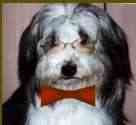 Hobo's Advice Column |
Welcome to my advice column.
Remember, I am only a dog like you. My opinions are to the best
of my knowledge but are only opinions, researched or what I feel is correct..
The writer of this page is not responsible for any actions the reader
may take as a result of reading this column. If that is
OK with you, keep reading. If not, then go back and enjoy the other
pages.You can address your questions to Hobo by email with the
topic Hobo's Advice (click on my picture) |
And more columns | More Hot Weather Tips
A previous column talked about trimming for summer and shared a little advice about hot weather. Another discussed sunburnt noses. With summer comes the many problems of heat, We thought we should offer some more advice. It is only common sense to avoid hot places. Just as a human can suffer from heat, your dog can also become sick or even die. Always provide a source of drinking water. Make sure it is fresh and cool. Remember, dehydration can occur with dogs just like with humans. Your dog gets rid of heat through panting, or through the pads of its feet. Also - if you leave water in a bowl, consider a spill proof bowl. Make sure there is a good source of ventilation (moving air), shade, and a place where they can cool off. If your dog is in a pen, consider purchasing a fan, There are sun covers also available to provide shade without sacrificing ventilation. There are also products named as "cool mats" or similar which are designed to hold water for a long time without spillage and provide a cool resting place. These have even been used in cars as the mat in a crate, etc. Avoid strong exersize in the warmest part of the day. Early morning or evenings are the best time. Limit the time according to the temperature. Never leave a dog in a parked car. The temperatures can reach over 150 F (66 C). Heat stroke, or death can result. It is a common error to believe that leaving a window partly open will eliminate problems with heat. Other travel may require special precautions. If flying, make sure your flight is direct. Dogs have been injured by being held in baggage compartments on hot runways (sometimes with ventilation cut off while the plane is parked). If traveling in a car, make sure you are prepared for feeding a water (and an occasional break for potty and exersize). Watch out for your dog's safety, allowing them to stick their head out the window (wind, dust and particles blowing in their face) can result in eye or nose damage or even swallowing something that may block their windpipe. Also, remember that your dog can get injured in car accidents just like a human. Most experts suggest having them ride in a crate or using a dog body harness. Never let them ride in the open back area of a truck If you leave your pet at home, make sure someone is there to supervise him and provide him with his needs. Consider using day pet care, or boarding kennel for longer trips. Outside might not be a good idea if left alone - not only is hot weather a concern, but also summer storms can be dangerous or cause anxiety. The common signs of heat stroke are:
Avoid walking or leaving your dog on hot surfaces such as sidewalks, asphalt or sand. These tend to reflect heat, and also may burn the paws. Not all dogs are swimmers - make sure you supervise your dog if near a lake. Also remember that your dog may drink dirty water and become ill from parasites or other undesirable contaminants. Drinking sea water (salt water) can be deadly in quantity. Some lakes and most pools are treated with chemicals - this is not a good place to get a quick drink. Dogs can get sunburn just like humans. Use sunscreen, There are products available for dogs, but a good hypoallergenic product can be used on noses and other exposed areas. You may also wish to consider products for the coat which protect from harmful UV exposure (and they will prevent damage to the coat as well). Summer is the season for insects. Protect against flees, ticks and heart worm. Consult your veterinarian for recommendations in your area. Warm weather also brings on allergies from pollen, grass weeds and fleas, etc. If your dog is chewing on himself, consult with a veterinarian. Careful of what dogs might drink - antifreeze can posinon your dog and a little puddle might be tempting to drink (it tastes sweet and seems to attract dogs) Use common sense. |